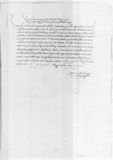Indiximus Diet of Poland ⌊generalia regni comitiaDiet of Poland ⌋ Cracow (Kraków, Cracovia), city in southern Poland, Małopolska, on the Vistula river, from 1038 capital of the Kingdom of Poland⌊CracoviamCracow (Kraków, Cracovia), city in southern Poland, Małopolska, on the Vistula river, from 1038 capital of the Kingdom of Poland⌋ ad 1536-11-01⌊festum Omnium Sanctorum1536-11-01⌋, ut iis de rebus, quae res ad publicam regni et aliarum ditionum nostrarum salutem, tranquillitatemque tuendam et conservandam pertinent, publico omnium ordinum consilio et consensu in medium consultetur. Quibus comitiis nos ipsi interfuturi ac praefuturi sumus. Prae quibus, ut rite omnia fiant, particulares etiam conventus tractuum instituimus. Nunc cum sic usu venerit, ut istic Provincial Diet of Royal Prussia ⌊terrarum Prussiae comitiaProvincial Diet of Royal Prussia ⌋ et particularia, et generalia Elbing (Elbląg), city in northern Poland, Pomerania, on the Vistula Lagoon, one of the three Great Prussian Cities (beside Gdańsk (Danzig) and Thorn (Toruń)) which had representatives in the Prussian Council; member of the Hanseatic League⌊ElbingiElbing (Elbląg), city in northern Poland, Pomerania, on the Vistula Lagoon, one of the three Great Prussian Cities (beside Gdańsk (Danzig) and Thorn (Toruń)) which had representatives in the Prussian Council; member of the Hanseatic League⌋ voluntate nostra, ut moris fuit antiquitus, aliquanto praecessu paper damaged⌈[u]u paper damaged⌉ra sint.
Hortamur
S(inceritatem) or S(trenuitatem)⌈S(inceritatem)S(inceritatem) or S(trenuitatem)⌉
Tuam et mandamus, ut istis bene peractis ac determinatis tempestive etiam ad Diet of Poland ⌊generalia regni comitiaDiet of Poland ⌋ antiqua consuetudine veniat cum Royal Council of Poland ⌊senatu regniRoyal Council of Poland ⌋ de Poland (Kingdom of Poland, Polonia)⌊republicaPoland (Kingdom of Poland, Polonia)⌋ consilia sua communicatura. Quod fecerit
S(inceritas) or S(trenuitas)⌈S(inceritas)S(inceritas) or S(trenuitas)⌉
Tua pro officio et gratia nostra.
Quae bene valeat.


 AGAD, AZ, 2999, f. 149v
AGAD, AZ, 2999, f. 149v